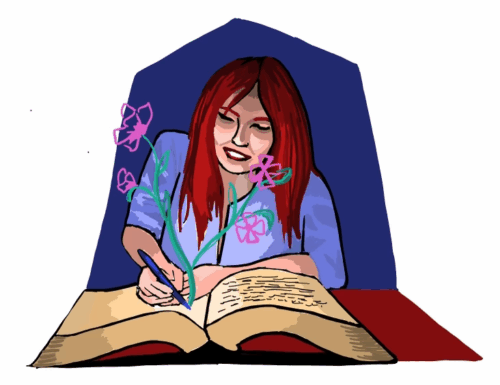The sun wakes me up right around half past six every morning. It’s my fault—I refuse to ever close the blinds. Today, it’s especially bright.
A stack of unread books that I’ve promised myself I will one day finish rests on my windowsill. Well, that’s only partially true. I’m halfway through the book on top—The Idiot by Elif Batuman. It doesn’t really have a plot, but it reminds me of being seventeen years old again and I like the cover. I throw it in my bag, though it’s solely a performative gesture. As soon as I step out the door, it won’t even cross my mind to open it for the rest of the day.
The other ones have piled up over the past few months. An assortment of contemporary fiction, books on psychology, and Peter Thiel’s guide to building successful start-ups. I made a note on my phone to buy Abundance by Ezra Klein and Derek Thompson, the next addition.
On my walk to class, I half listen to the news podcast I listen to almost every morning. Almost. It tells me about the latest drama in Trump’s tariff obsession and how investors are riddled with uncertainty, so the markets are collapsing. I’ve heard the word uncertainty so many times in the past few weeks that it drives me crazy. I hate uncertainty. I find it impossible to wrestle with.
The podcast ends so I play a different one. But the New York Times ‘The Headlines’ tells me that Harvard is suing Trump, so campus itself radiates with uncertainty too. It’s inescapable.
I think about uncertainty throughout my entire lecture. My friend texts me after class, and we go for a walk along the river, lost in conversation about the latest gossip and boys and our hopes for the summer. We watch the boats glide by; the rowers cutting through the water in unison and the crisp sounds of the oars feathering.
As we sit down at one of the wooden benches, I’m reminded of sitting at a bench just like this with a boy, what feels like a lifetime ago. By the end of that night, I told him, hesitantly, what I wanted to do when I grew up—not the private equity answer but the real dream of mine that I don’t tell anyone. We kissed and never spoke of it again. Nine months later, he remembered—he teased me about it in front of everyone, joking that I became a sellout. I laugh too.
We’re friends, now. I saw him a few nights ago. We sat across from each other at dinner, secretly texting back and forth our commentary on what was happening around us, the people and conversations. We dance around looking at each other, but our eyes can’t help but meet. I don’t think anyone saw—but it’s more of a hope. Eventually, we started talking about Portugal—he’s always wanted to go, to surf on the beaches. I have too.
I start focusing on the water again. I ask her if we should go to Portugal this summer. No, she says. She wants to go to Madrid.
The boats continue to pass us by. It’s seventy degrees and it’s spring, so it’s too nice for them not to be on the water. The coxswains shout out calls and words of encouragement, their voices rhythmically echo. People are walking and running, absorbed in the music of their headphones as they stall on the bridges. It rained yesterday, and it probably will again tomorrow, so the weather begs us to stay outside as if it can take over our will. It does. We’ve never felt more free.
We all skip class. We sit together in the courtyard, we bathe in the fleeting sunlight.
On the orange chairs, I pull out the book I haphazardly threw in my bag this morning. I open my bookmark to gloss over the pages of an ethereal stream of consciousness, but I am too distracted; our friends join us and my computer aches to be opened instead. Soon, the four of us are all scrolling through our assignments and to-do lists for everything we’re missing. Eventually, I’ll mindlessly move through them. It always gets done.
Somehow, we talk about the implications of saying please and thank you to ChatGPT—apparently, it’s costing us millions in dollars and electricity. I am conflicted. We’re carelessly debating about the whole thing. It never crossed our minds and we’ve typed thank you more times than we can count and we’re laughing so hard I wonder if the entire courtyard can hear us. Later, I think the dilemma of our politeness is the epitome of some dystopian world. Do we preserve the routine elements of humanity in the face of artificial intelligence, or do we save the environment? I, still, am conflicted.
Through the gates, I watch the water glisten and think about how I would only embarrass myself in front of him if we ever did go surfing in Portugal. There must always be boats on the water there.
For now, it’s almost six in the evening, and I am tired but for once I don’t want coffee. The sun is enough.
If only it were spring in Cambridge forever.
Meena Behringer ’27 (meenabehringer@college.harvard.edu) writes Arts for the Independent.

